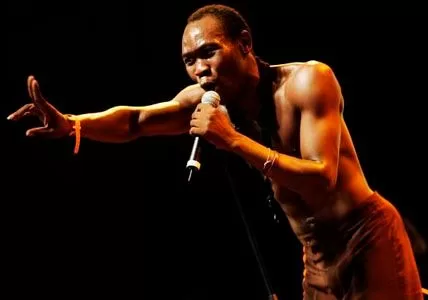ANALYSIS: Seun Kuti’s assault saga shows he needs character to be like Fela

Roskilde festival 2007 Seun Kuti & Egypt’80 på Cosmopol.
Seun Kuti, the last child of the late Afrobeat legend, Fela Anikulapo Kuti, has been in the news for allegedly assaulting a police officer who is now said to be in coma.
The incident, which took place on May 15, has continued to elicit intense outrage. The singer has also turned himself in to the police after being placed under arrest.
"We will be back" @NigeriapolicePR reacts to viral video of @seunkuti slapping Police officer. #sundayvibes #SaintObi pic.twitter.com/DDUsC4QkvZ
— Crisp Nigeria (@crispnigeria) May 14, 2023
For long, Seun’s antics and activism have seen many likening him to Fela, his father.
Seun has since been a strong fan of his father’s musical and political heroics. In his heyday, Fela, a spirited freedom fighter and activist, was a nemesis to the government.
He constantly spoke truth to power and fought societal ills such as corruption, human rights abuses among others through his music.
The late Afrobeat patriarch’s songs were packed with social and political messages. He was known for being vocal against the oppression of the military government in the late 70’s, 80’s and 90’s with songs which resonates with the people till this day including ‘Zombie’ and ‘V.I.P’.
Fela also took strikes against world powers with songs like ‘Beasts of No Nation’. The legend who was arrested 200 times due to his activism believed that it was for a good course.
In a 1986 interview with SPIN magazine, Fela said: “I believe in higher forces. I believe that suffering has a purpose. I cannot suffer like this for no reason. I’m not working for any selfish reason or ulterior motives. I’m working for the improvement of my fellow man.”
Like his father, Seun has toed a similar path. He joined his father’s band just at the age of nine. In November 2020, he also led the revival of Movement of the People, the political party founded by his late father, with the goal of giving power back to the masses.
Seun has always seen himself more of an activist than a musician. “I am a revolutionary first, and a musician second…if I had to choose one or the other, that is…,” he declared in an interview.
A revolutionist Seun claims to be, but not in the way that his father was. Although similar, both have different approaches.
Seun’s focal point is more on external forces than internal forces. This approach might be linked to time change, as the military era was of a different political atmosphere when those with power oppressed those without, dictating their pattern of vocalisation and action.
He views multinational corporations like oil companies and global institutions like the World Bank, IMF, and UN as culprits.
His approach to music has not been without criticisms. He has been accused of not being involved in the country’s politics or using his influence for a good cause on many occasions.
For critics, Seun lacks the personality and character to sustain Fela’s legacies and his recent decision to slap a policeman does not reflect the kind of act that would have gotten his father jailed even in his freedom fight.
Yes, Fela gave the government lyrical slaps, but physical ones, not proven.
Seun typifies someone jostling for attention, not inspiring a genuine people-oriented movement. His penchant to jump on trends — whether reasonable or not — inability to control anger and emotions has made it largely difficult to see his real intentions on issues.
Fela’s actions, though controversial, were viewed by some as political moves and protest against the government.
In a 2020 interview, Seun said “All of Fela’s actions, smoking weed and all, …women, all of his actions were targeted at the system so rigid and so conservative that even artistry could not even breathe. Fela’s life was a rebellion.”
Seun may be fighting the right course. But like his father, he needs the right charisma, character, and personality to be taken seriously.


